In this enlightening episode of The SME Growth Podcast, Dave Parry from Wellmeadow sits down with Tracy to explore the challenging intersection of imposter syndrome and sales. This conversation delves into why many business owners and professionals struggle with selling their products or services, despite being experts in their field. The discussion addresses the fundamental psychological barriers that prevent even highly competent entrepreneurs from effectively communicating their value proposition and closing deals with confidence. Tracy shares valuable insights from her extensive experience coaching businesses with turnovers up to £7 million, offering a blend of practical techniques and psychological approaches to build authentic confidence. Throughout the episode, she provides accessible frameworks for aligning business offerings with target markets and developing the inner resilience needed to overcome rejection in sales environments. Whether you're a seasoned entrepreneur battling self-doubt or a business owner looking to refine your sales approach, this episode provides actionable strategies to transform your relationship with selling and achieve greater business success.
Head over to our YouTube channel and subscribe for exclusive content and a chance to see the fully clothed versions of our episodes: @TheSMEGrowthPodcast.
You can listen to the full episode here
Listen to the full episode now



Key Topics Discussed
Understanding Imposter Syndrome in Sales
- Exploration of how knowledge gaps in sales environments contribute to feelings of inadequacy, particularly when business owners must transition from being technical experts to becoming effective salespeople for their own products and services
- Analysis of why the fear of rejection creates significant psychological barriers to effective selling, especially for those who have experienced negative sales interactions in the past or witnessed poor sales techniques
- Discussion of common misconceptions about what makes someone "good" at sales, challenging the stereotype of the pushy salesperson and highlighting how authenticity often outperforms traditional high-pressure tactics
- Examination of how past negative experiences with salespeople shape our approach to selling, creating reluctance to adopt behaviors we've found unpleasant when we've been on the receiving end
- Investigation of the connection between self-confidence and sales performance, exploring how imposter syndrome can undermine even technically excellent business propositions
Building Authentic Sales Confidence
- Detailed breakdown of why qualifications and certifications often matter less than demonstrated expertise and genuine confidence, with Tracy noting she's never been asked to prove her coaching qualifications
- Analysis of how trust is established through presence, knowledge, and authenticity rather than relying on credentials or formal validation from external sources
- Examination of effective practice techniques including roleplaying with peers, practicing presentations in front of mirrors, and gradually building confidence through repeated real-world testing
- Discussion of innovative approaches like using AI tools such as ChatGPT to simulate challenging customer conversations and practice responding to difficult objections in a safe environment
- Consideration of how networking environments provide low-risk settings for refining sales techniques, allowing for experimentation without the pressure of closing specific high-value deals
Creating Effective Sales Strategies
- Structured approach to aligning product features, pricing strategy, target customer profiles, and messaging into a coherent whole that resonates with your intended market and addresses genuine needs
- Importance of finding the "click" where all sales elements work together cohesively, creating an offering that makes intuitive sense to both the seller and the target customer
- Analysis of positioning and differentiation strategies in competitive markets, focusing on how to establish a unique value proposition that stands out rather than competing solely on price or features
- Discussion of consultative selling approaches that focus on understanding customer needs versus traditional product-focused techniques that may feel uncomfortable for those with imposter syndrome
- Examination of common mistakes in lead generation and customer targeting, particularly the tendency to focus on tactics before establishing a clear strategy and unique market position
Self-Esteem Development Techniques
- Exploration of practical journaling exercises from the "28 Day Self-esteem Reboot" book, providing a structured approach to recognizing personal value and building confidence over time
- Analysis of the "I Like Myself" four-step process that involves identifying daily highlights, understanding why they were significant, recognizing your contribution, and creating positive self-affirmations
- Discussion of the importance of consistency and daily practice in developing positive self-perception, with Tracy emphasizing the need to maintain the exercise for several months to see significant results
- Consideration of how even small daily moments of recognition can create significant mindset shifts when practiced consistently, making this approach accessible even to those with busy schedules
- Assessment of the relationship between personal self-esteem and business success, recognizing that confidence in oneself often translates directly to more effective business development activities
Quotes to Remember
"We don't have to become experts in sales, necessarily, but we do have to become experts in selling what it is that we do."
"That absence of knowledge in the sales environment is what's causing a lot of the imposter syndrome."
"When you have that degree of confidence, when you can establish that trust, you don't need to go into that level of detail."
"I'm a big fan of practice and just going out and being willing to make mistakes, just have the conversation and keep tweaking until you have something that works."
"If we get the wrong product with the wrong pricing strategy or it's targeted at the wrong person, it doesn't work. But if you can get that click working, then you've got the beginnings of really taking something to market."
Top Takeaways:
- Find Your Sales Alignment: Success in sales requires finding the perfect alignment between your product, pricing strategy, target audience, and positioning in the market—what Tracy calls "the click." Without this alignment, even the best lead generation tactics will struggle to produce results.
- Practice Makes Progress: Rather than avoiding sales conversations, use low-risk environments like networking events to practice and refine your approach without the pressure of closing major deals. Each interaction provides valuable data to improve your technique.
- Build Self-Confidence Systematically: The "I Like Myself" exercise provides a structured approach to developing self-esteem through daily reflection and positive recognition of your own contributions, creating a foundation for authentic confidence in sales situations.
- Embrace Imperfection: Being willing to make mistakes and learn from real conversations is more valuable than seeking perfection before engaging with potential customers. Tracy emphasizes that consistent practice with refinement leads to natural improvement over time.
- Leverage New Learning Tools: Consider innovative approaches like using AI tools such as ChatGPT to simulate challenging sales conversations for practice in a safe environment. This modern approach allows for repeated practice without the emotional stakes of real interactions.
Head over to our YouTube channel and subscribe to The SME Growth Podcast. Share your thoughts and business challenges in the comments section of our community page: https://www.youtube.com/@TheSMEGrowthPodcast/community
